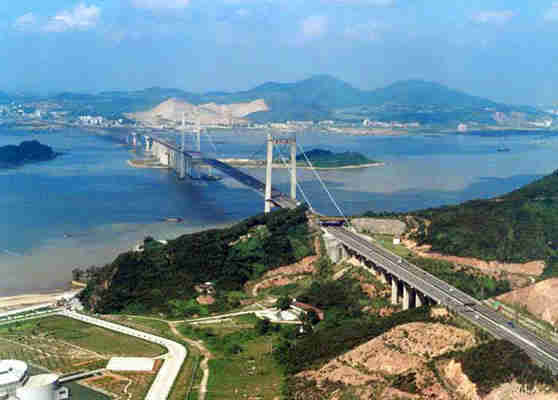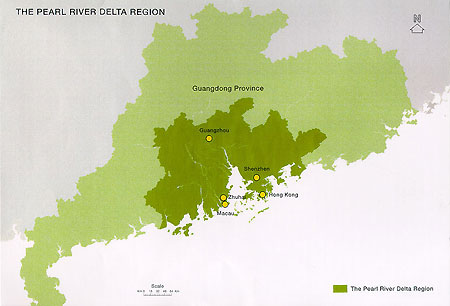Pan-Pearl River regional co-ordination in blueprint
( 2003-11-11 10:09) (China Daily HK Edition)

In the vast areas south of the Yangtze River, local economies should be consolidated to form a better co-ordinated economic area called the "Pan-Pearl River Delta Region", which actually covers eight provinces, one autonomous region and two special administrative regions plus one municipality directly under the central government.
That is the vision conceived by Guangdong Governor Zhang Dejiang and will be explored in detail at a forum scheduled to be held early next month.
Liang Guiquan, president of the Guangdong Academy of Social Sciences, the organizer of the forum as well as the consultant on the notion, talked to China Daily to elaborate on his win-win theory for economic co-operation on such a vast scale.
Liang explained that every economy has its own unique pace. When a market is fully developed, one naturally looks outward for further growth. It usually starts with merchandise, and then graduates to capital.
"Made-in-Guangdong" products have always been popular in neighbouring provinces, and "in my opinion, we have reached the stage when we will export capital to these places", said Liang.
Industrial expansion means there will be need for more space. Wherever a market emerges, manufacturing will follow to better serve this market. Guangdong is actively developing its service industries now, but eventually that will mature, too. So, in the next 20 years, Guangdong's economic clout will "spill over" to its neighbours and stimulate the growth in those places.
Liang said that two years ago there was a palpable sense of rivalry of "I grow and you remain stagnant and that will make me look good". For example, Guangxi was quite wary of its eastern neighbour and pushed for its own port in the south.
"If you compare the traffic on the two highways, you'll instantly know that economic growth defies administrative meddling. It has its own logic. The highway from Guangxi to Guangdong is much busier than the north-south artery inside Guangxi. An economic bright spot naturally attracts those around it," asserted Liang.

He further maintained that the less-developed areas have to be "pulled along" in growth, otherwise you won't have a new market or new resources because consumers in those places would not be able to afford your products and services.
"I used to suggest to provincial-level leaders that when we plan for Guangdong's future, we will have to keep in mind the surrounding provinces. It's for the benefit of sustainable growth. Americans don't seem to realize that as they always find trouble with China's growth," he said, referring to the wave of protectionism and China-bashing in the US.
"This is a situation of interdependence," Liang clarified. "Since Guangdong took off economically ahead of others, we have the responsibility to bring others along with us. This does not mean we will dominate them or we'll call the shots. It only means that we'll take the initiative to serve them in a more co-ordinated manner."
Some of these "neighbours" are members of the "Pan-Pearl River Delta Economic Region", which, still on the drawing board, comprises Guangdong, Guangxi, Fujian, Hunan, Hainan, Jiangxi, Yunnan, Guizhou, Sichuan, Chongqing, Hong Kong and Macao.
According to Li Chunhua, who is co-ordinating the meeting, provinces as far away as Gansu want to come to the forum and discuss the possibility of being included in the "master plan". "But it would be too far-fetched to call Gansu part of Pearl River Delta anything," Li said.
Liang cited the example of Hunan Province, where power costs much less than Guang-dong.
"If we have this system of co-operation, we can move some of our power-consuming plants there to take advantage of the cost benefit. Another example is Guizhou, rich in water and coal. It can export power to Guangdong. Yet Guangdong may fear that it has no control over utility sources. That's why we will need a mechanism to smooth out wrinkles and guarantee it will benefit everyone."
Liang Guiquan applied the same reasoning to Hong Kong's relations with the rest of China. "Hong Kong is far ahead of Guangdong. It has already found itself in the dilemma of economic restructuring, something that Guangdong will encounter down the road."
Liang feels that Hong Kong people, in general, have not adjusted very well.
"They tend to whine a lot as if they were spoilt children. Maybe they have lived the good life for too long. Everyone knows Hong Kong's strength lies in its service sector. So some people are saying Guangdong should not develop its service industry, such as ports, so that there will be no direct competition. They even propose to lure back some of the manufacturers back to Hong Kong. Nothing could be more foolish than that."
Liang suggested that Hong Kong first broaden its service area to include southern China.
"Just imagine that all the provinces south of the Yangtze River reach the economic level of Guangdong in the mid-1990s. What a mammoth market that will be for Hong Kong's service providers."
Liang also said Hong Kong should "upgrade" its service to meet the demands of an ever-increasing manufacturing sector on the mainland.
"Better be Jack of all trades than a one-trick pony that can offer only so much," he said.
Hong Kong's strategy should not be to compete with Guangdong, but to join hands with its northern neighbour in a concerted effort to hasten the development of the vast surrounding region.
"That will be beneficial to Hong Kong, to Guangdong, and to the whole nation," Liang expounded.
"Of course, Hong Kong does not need to limit its sights to only one market. It should look to serving the entire country and playing a major role in its growth," Liang said.
"Hong Kong really needs to be forward-looking. As long as fast growth in South China is guaranteed for the next 20 years, the positions of Hong Kong and Guangdong will be rock solid because products will flow through the ports here to the world market. Hong Kong is irreplaceable. Neither Guangdong nor Shanghai can take its place."
|

